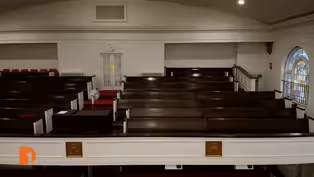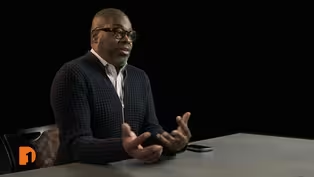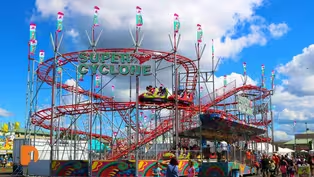
From Southern Kentucky to Garden City: Nolan Finley details his family’s history during the Great Migration
Clip: Season 10 Episode 2 | 7m 18sVideo has Closed Captions
One Detroit contributor Nolan Finley shares his family’s history during the Great Migration.
One Detroit is gathering stories from people around Southeast Michigan, hearing how their families came to Detroit. It’s part of Detroit PBS’ Destination Detroit initiative chronicling the history of Detroiters. One Detroit’s Bill Kubota talks with Nolan Finley about his family’s migration and his roots on a tobacco farm near the Tennessee border.
Problems playing video? | Closed Captioning Feedback
Problems playing video? | Closed Captioning Feedback
One Detroit is a local public television program presented by Detroit PBS

From Southern Kentucky to Garden City: Nolan Finley details his family’s history during the Great Migration
Clip: Season 10 Episode 2 | 7m 18sVideo has Closed Captions
One Detroit is gathering stories from people around Southeast Michigan, hearing how their families came to Detroit. It’s part of Detroit PBS’ Destination Detroit initiative chronicling the history of Detroiters. One Detroit’s Bill Kubota talks with Nolan Finley about his family’s migration and his roots on a tobacco farm near the Tennessee border.
Problems playing video? | Closed Captioning Feedback
How to Watch One Detroit
One Detroit is available to stream on pbs.org and the free PBS App, available on iPhone, Apple TV, Android TV, Android smartphones, Amazon Fire TV, Amazon Fire Tablet, Roku, Samsung Smart TV, and Vizio.
Providing Support for PBS.org
Learn Moreabout PBS online sponsorship(bright piano music) - I'm just going through here looking for the ones.
There's my mom and my sister.
And that is on Belle Isle.
- [Bill] We all got a story, right?
Tell me about yours.
- Well, my family was part of the Great Migration from the South.
And it was not just African Americans who came north.
It was white people too, poor farmers and what have you, World War II vets who came up here looking for opportunity.
And my dad was in that latter group.
You know, he went into the Marines in 1944, was in combat.
When the war ended in 1945, he stayed in Japan for two or three years in peacetime duty.
And when he went back to his home in southern Kentucky, you know, he was raised on a tobacco farm there.
And he wanted to stay.
He wanted to stay there.
So he tried his hand as a farmer.
He tried running a little store.
He tried running a sawmill.
He tried any number of things.
And then finally he just decided his opportunity was elsewhere.
And he came up here first, and he and my mom married, and they were back and forth over the first five, six years.
They'd be here a while and there'd be some kind of downturn, he'd lose his job, and he'd go home and work there for a while.
That's my third birthday.
I was born during one of their return stays in Kentucky.
But you know, it took a while for him to take hold here and get settled.
He first lived in Detroit when he was here by himself.
And he drove street cars.
Worked for Chrysler a little while.
I remember him telling a story when he first came up here walking down Woodward Avenue.
And he said every bar along Woodward Avenue had a folding table out front with recruiters from the auto companies just signing people up as they came in and out of the bars.
I mean, it was that kind of a boom time.
Eventually he settled in for his longest stretch, and until he passed away, at a chemical plant in Ferndale.
And he worked there for 25, 30 years.
These are my uncles.
This is in Kentucky, my uncles and aunts.
My parents combined had 15 brothers and sisters, and all but four of them came north to different places.
Most of them went to Indiana.
We came to Detroit just because my mother had a cousin who was here and said, "Oh, there's all kinds of opportunity here."
And so they came up here and settled initially in Detroit, then in Garden City.
Yeah, that's the house in Garden City.
There was a bus line called the Brooks Bus Line, and it would run from Detroit, down 23 in eastern Kentucky, and then it would run from Detroit to Paducah in the west.
And you know, these people from Kentucky go back and forth getting the jobs, coming home on the weekends.
My county, Cumberland County in Southern Kentucky had 17,000 people in it before the war.
After the war, it had 7,000.
That many people left to go mostly north - [Bill] You'd go back and forth, probably still do, and you never really cut ties there.
- Our family didn't.
I mean, they went home, my parents went home every opportunity.
We were sort of schooled in the idea that that was our home and they always dreamed that they would go back.
And of course my mother did for a little while, you know, before she died.
But my dad died, never got the chance.
When my mother had to go to work, the kids, there were three of us then, we stayed down there, lived with my grandparents and aunt and uncle.
And when I was old enough, I went every summer and worked on my uncle's tobacco farm 'cause his sons had been drafted into the Vietnam War, and so I was sent to help.
- [Bill] Maybe there's some people take great offense with what you'd hear with Ypsitucky, Taylortucky.
- Oh yeah everybody's gotta have somebody they look down on, you know?
And it's why I think people from that part of the country, whether it was Kentucky or Tennessee or Arkansas or wherever, West Virginia, they sort of stuck together.
When we came up here, we found a community of other migrants from the South, and mostly from that part of the south.
And they all went to the same church, became our social group.
And it was folks looking from support from other people who understood their story and their journey.
We've been here, branches of my family, since the country started.
I mean, I had ancestors on the Mayflower, but in Kentucky, we'd been in our part of Kentucky for 200 years and I can go now and see and visit the graves of my great-grandparents and great-great-grandparents within a 5, 10 mile radius.
You know, we pretty much stayed close to home until, you know, this Great Migration occurred.
And they were all, for the most part, poor farmers, dirt farmers, tobacco farmers, subsistence living.
I mean, they struggled to stay where they were - [Narrator 4] 100 years ago the pioneers pushed west.
But here in these mountains, some of them stayed to farm the fertile land, to live well by ax and gun and plow.
Now the land is no longer- - That's my mother as a teenager.
You know, that's probably in the 40s sometime.
Late 40s.
My grandparents.
My dad's parents and their chickens.
I think for a lot of folks, no matter where they came from, you know, you think you don't forget where your home was.
You don't forget the things that shaped you and the people who shaped you.
And it's easy for us to look at people from other cultures, other countries, what have you, and say, "Why are they still hanging on to those old traditions and those old ways?"
And there's a comfort in that.
And it's a connection.
It's important.
Because for most people, there's that element.
You know, you come from somewhere else, somewhere down the line, and it's important to remember that.
It's not easy leaving a home.
And I often think about the people who came here from other places knowing they never get to go back.
We went back every weekend for a while, and it was a grueling trip.
But many of these people coming over here, they never know if they're gonna see their families again or their homeland again, or the the people they'd love, and they're starting absolutely from scratch.
And I think we should try to think about and understand how hard that would be to put us put ourselves in that position.
The Black Church’s role in the Great Migration to Detroit
Video has Closed Captions
Clip: S10 Ep2 | 7m 14s | A look at how Black churches helped Southerners who came North during the Great Migration. (7m 14s)
Down South to Detroit: Stephen Henderson details his family’s history during The Great Migration
Video has Closed Captions
Clip: S10 Ep2 | 7m 49s | Stephen Henderson shares his family’s journey from the South to Detroit during the Great Migration. (7m 49s)
One Detroit Weekend | Things to do around Detroit this weekend: July 11, 2025
Clip: S10 Ep2 | 2m 20s | Summer festivals, events on the water, art fairs and more around metro Detroit this weekend. (2m 20s)
Providing Support for PBS.org
Learn Moreabout PBS online sponsorship
- News and Public Affairs

Top journalists deliver compelling original analysis of the hour's headlines.

- News and Public Affairs

FRONTLINE is investigative journalism that questions, explains and changes our world.












Support for PBS provided by:
One Detroit is a local public television program presented by Detroit PBS


